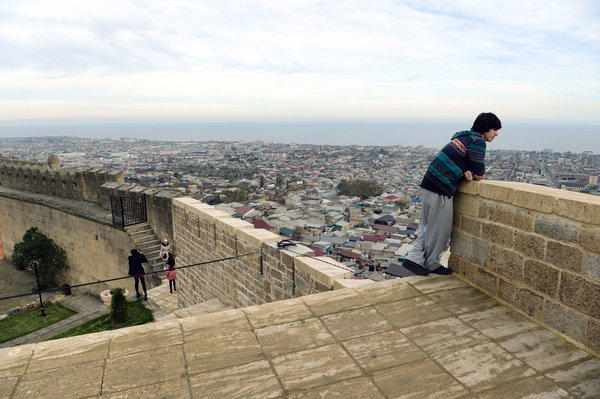By NEIL MacFARQUHAR
Not so many years ago, Derbent buzzed with plans to celebrate its 5,000th anniversary, envisioning the day when it would claim the title of "Russia’s oldest city.”
Not so fast, came the response from Moscow. Like a plastic surgeon with a supernatural touch, the central government peeled away centuries. Out went the plans to commemorate 5,000 years, in came a grand fete to mark the city’s 2,000th birthday.
The mix of Muslims, Christians and Jews who live here along the Caspian Sea reacted collectively with a baffled "What?!” and continued to cherish the older date.
"Throughout the Soviet period they said it was 5,000 years old, and then suddenly they changed it,” groused Alex Abdulfez, a young tour guide at the ancient fortress called Naryn-Kala, which dominates the town. "I don’t recognize any other date. I don’t accept it; nobody does. Everybody in Derbent says it’s 5,000 years old.”
The date debate is a small if telling example of the tension that has long scarred relations between Moscow and the far-flung reaches of its vast empire, particularly in predominantly Muslim areas like this one.
Many in Derbent are convinced that the Kremlin lopped 3,000 years off its age to avoid having a Muslim city named the oldest urban settlement in a country that presents itself as the defender of traditional Christian values.
"I would say 95 percent of Dagestanis think it was a political decision, not a scientific one,” said Alexander A. Kudryavtsev, an accomplished archaeologist who supports the older claim.
The truth is somewhat complicated.
No one questions that Derbent was once a major ancient hub, dominating a skimpy strip of flat land locked between the wide Caspian Sea and the craggy Caucasus Mountains. The Silk Road, the main international caravan trade route between Asia and Western Europe, passed through here.
Circumventing Derbent proved impossible. Its daunting fortress and formidable twin walls bracketing the town from the ramparts to the sea basically formed a giant, much-coveted tollbooth. Its name in various tongues has always been a variation on portal, including Bab al-Abwab, or Gate of all Gates, in Arabic.
With its militarily and economically strategic location Derbent thrived, evolving into a major administrative and religious center. Christianity and Islam first penetrated the Caucasus through Derbent. It was a medieval megalopolis, with a population estimated at up to 60,000.
Then Mongol hordes sacked the place in the 13th century. Time and history slouched on. Derbent became a backwater, left with a magnificent if crumbling citadel and just one of its imposing walls.
Today, with a population of 120,000, it is listed by Unesco as a World Heritage Site, but not many tourists show up. Mr. Abdulfez, the guide, said he saw maybe 15 Westerners in 2015. If it could call itself the oldest city in Russia, residents say, maybe visitors would overlook the Islamic insurgency rumbling in the background.
As to why it cannot, natives tend to point the finger at President Vladimir V. Putin. "It was decided at the highest level,” said Dmitry Dunaev, who as deputy mayor accepted the date change. "Putin signed the decree that officially made it the 2,000th anniversary, which he did based on scientific research.”
This being Russia, the date issue spawned an elaborate conspiracy theory. In brief: Mr. Putin is a history buff. After he annexed Crimea in 2014, he startled historians by christening Chersonesus, founded some 2,500 years ago, the historic root of Russia, as holy as Jerusalem.
In addition, Derbent’s cast of Arab, Persian and Turkish rulers long appreciated its role as the choke point preventing the marauding nomads in what became Russia from plundering the far more civilized empires of the Middle East.
In other words, many Derbent residents are convinced that it was denied its full age because it clashed with various founding myths that Mr. Putin wanted for Russia.
At the citadel, the Muslim call to prayer drifts up from the eighth-century Juma Mosque, the oldest in Russia. The stand of sycamores in its extensive courtyard are 800 years old, said Farhat Aliev, the mosque guide.
While showcasing a complex created by the earliest Arab conquerors in the eighth century, Mr. Aliev quoted a sentence that he said was uttered by the Prophet Muhammad and recorded in the Hadith, a compilation of his sayings that are considered holy scripture: "Muslims will enjoy no repose until they capture Derbent.”
Since the Islamic calendar starts in 622 on the Western calendar, however, any such line would not prove ancient lineage.
The sentiment that Derbent is older than its official age extends through other faiths. The Jewish community shrank to 1,345 in 2010 from more than 13,000 in 1989, just before the doors to emigration opened, according to Russian census figures. In the basement museum of their remodeled synagogue, Jews pointed out prized community artifacts.The oldest was a Torah from 1516.
At the main Russian Orthodox Cathedral, a woman dusting the wall of icons overheard a question about the town’s age to Archpriest Nikolai Kotelnikov. "Five thousand years,” she volunteered, repeating the date even after the cleric shushed her. (An underground chamber in the citadel shaped like a cross might be an ancient church.)
Plenty of evidence supports the 5,000-year-old date. Archaeologists found remnants of settlements that old — two primitive terra cotta statues of a fertility goddess as well as pottery — in the commanding heights where the citadel now stands.
Murtazali S. Gadjiev, the head of the department of archaeology at the Dagestan Center of the Russian Academy of Science, noted that the older date held wide popular appeal.
He himself excavated an early Bronze Age ax that is part of the 5,000-year-old trove. The results were documented in a widely distributed book in the early 1980s.
"It became a sensation,” Mr. Gadjiev said. "That is how the idea that Derbent was 5,000 years old came to live in the popular imagination.”
Then some years back a group of prominent citizens decided to mark Derbent’s 5,000th anniversary in 2015. They erected a triple-barreled arch carved with "Derbent 5000” that still stands. They sold T-shirts and coffee mugs and bottles of local brandy emblazoned with the same logo.
"It was an outburst of local patriotism,” Mr. Gadjiev said. The anniversary needed federal approval, however.
He laughed about being bashed as a "Kremlin stooge” after sitting on the official commission of archaeologists who decided that the Bronze Age materials unearthed from roughly the third millennium B.C. were an aberration, that uninterrupted habitation started about 2,000 years ago.
So is it the oldest city or not?
Mr. Gadjiev sighed deeply. "I am against such an approach — it’s not a sports event,” he said. "Let’s just say it is one of the oldest.”
In fact, Derbent myths seem to proliferate endlessly. There is no mention of Derbent in either the Quran or the Bible or any holy scriptures, he noted.
"People just grabbed this idea that Derbent was 5,000 years old and they liked it,” Mr. Gadjiev said. "It also took mankind a long time to realize that the Earth is not flat.”
(nytimes.com/2016/02/18/world/europe/derbent-as-russias-oldest-city-think-again-moscow-says.html?_r=2&referer=http://inosmi.ru/social/20160218/235460532.html)
www.ann.az
Follow us !











